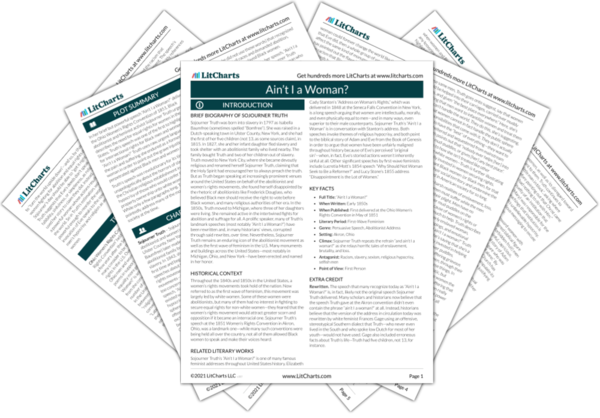Racism in the Women’s Rights Movement
Sojourner Truth’s landmark speech “Ain’t I a Woman?” argued for equal rights for women in the United States—but it also highlighted the racism that permeated the U.S.’s women’s right movement. The speech’s central repeated refrain, “ain’t I a woman?” implicitly references the fact that white women within the movement largely excluded Black women from the fight for equal rights. By calling attention to how U.S. society treated Black women differently from white women, Sojourner…
read analysis of Racism in the Women’s Rights MovementMen, Paternalism, and Hypocrisy
Throughout her speech “Ain’t I a Woman?” Sojourner Truth repeatedly calls attention to the tension, paternalism, and hypocrisy that defined relations between men and women in the mid-19th century in the United States. Men of the time claimed that women were too dull, fragile, or inexperienced to have roles in the public sphere or have access to suffrage (the right to vote). But throughout her groundbreaking speech, Truth called out men’s hypocritical treatment of women…
read analysis of Men, Paternalism, and HypocrisyChristianity as an Excuse for Oppression
At the climax of her 1851 speech advocating for Black women’s rights, Sojourner Truth states that “That little man in black there […] says women can’t have as much rights as men.” Here, Truth is pointing out how clergymen of her era (who traditionally wore black) often use religion to justify women’s ongoing oppression and exclusion from the public sphere. But over the course of her speech, Truth points out how cruel and wrong it…
read analysis of Christianity as an Excuse for Oppression







